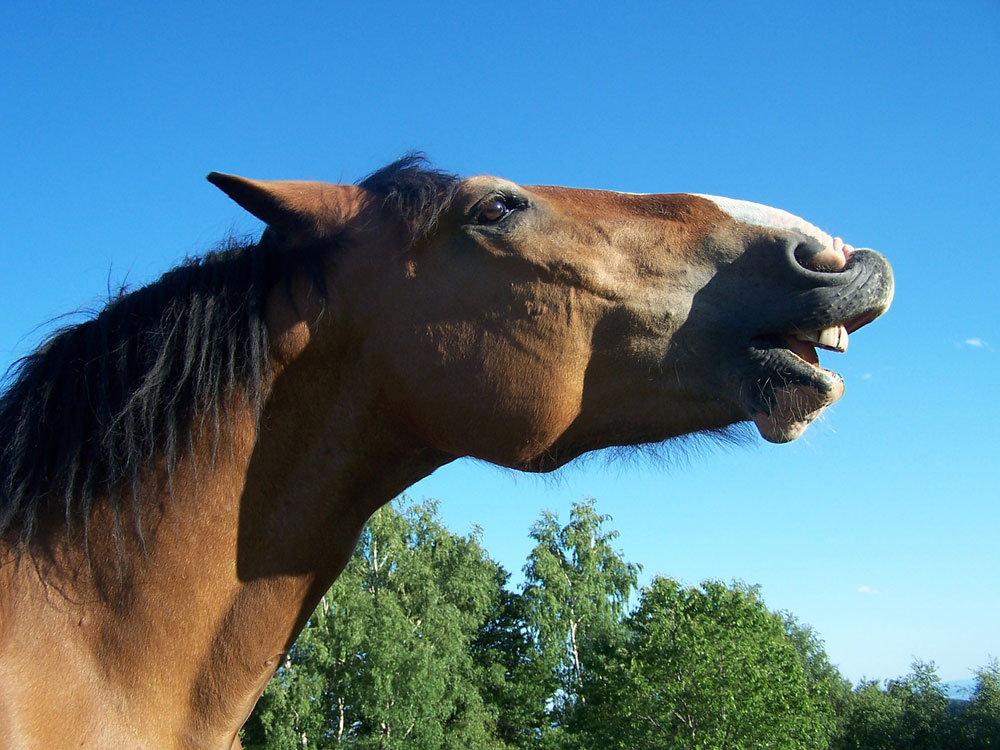[ad_1]

Equine Vocalization 1: Whinny
whin•ny; /(h)win/
a loud, high-pitched neigh.
What it is: The vocalization of a whinny is a horse’s social call. In the wild, the whinny is how horses find one another. Each horse has a unique whinny that you (and other horses) can tell apart.
What it Means: This call means, “Where are my friends?” Or, “Who is willing to be my friend?” The horse is lonely and looking for a herd he knows or any horse that is willing to be a herd with him.
How to Respond: He’s feeling insecure, so don’t punish him. It’s common for horse handlers to feel embarrassed or frustrated when their horses are whinnying constantly. Resist your frustration and calmly ask the horse to work. Here’s how:
1. In the moment that your horse is whinnying, put him to work and engage him in an activity, so he has something to focus on. Keep his mind engaged in a positive and effective way. Don’t be harsh or rushed, but provide direction.
2. Ask your horse to turn right, turn left, back up. Provide kind and constant direction until he focuses his attention on you. Once he relaxes, allow him to rest. If he whinnies again, repeat.
3. If you can get your horse to feel the same sense of comfort he feels with the herd, then he won’t feel alone anymore. As you build your relationship over time, the horse will feel safe and no longer need to whinny when he is with you.

Vocalization 2: Nicker
nick•er; /nikr/
a soft, low, breathy whinny.
What it is: The soft purring sound your horse makes implies “Come to me.” It can also mean “Look at me” when a stallion is showing off to a mare.
What it Means: It’s most purposeful between a mare and foal; if the foal wanders off, the mare will nicker to the youngster to call him back. It’s also the sound you hear each day at feeding time which translates to “Come bring me the food.”
How to Respond: When a horse in a wild herd orders around another horse and takes away food, he is the dominant horse. If your horse nickers at you to ask for individual treats, he may think he’s dominant, and that can impact all aspects of your relationship. Here’s what to do:
1. Don’t let the nicker be a signal that you should go give your horse extra food or a treat.
2. If the nicker only happens when you’re feeding all the horses at a regular feeding time, that’s acceptable.
3. Don’t feed a horse in the moment that he is showing aggressive behavior. Wait for him to calm down and only feed when he is calm—even if it’s just for a moment.
Vocalization 3: Snort
snort; /snrt/
an explosive sound made by the sudden forcing of breath through the nose.
What it is: A horse’s snort is an alarm. If a horse does it and holds his head high, he has detected a threat.
What it Means: When extremely alarmed, the horse may add a rattling sound to the snort, or he may just blow as a milder warning. The snort may also be used during play; when he wants to practice his flight response, he’ll often snort first, and then run. You may hear your horse snort on a trail ride if he detects a strange scent. Here, in the Rocky Mountains, the horses will often snort when we approach elk on the trail.
How to Respond: If you hear a horse snort, stop and make an assessment. It could be one of two things:
1. Look where the snorting horse is looking. There may be something in the distance that is a legitimate threat, or it could be that the horse is fearful of something benign.
2. The horse could be snorting at you if you’re doing new groundwork or establishing boundaries with a previously unhandled horse. The horse needs to have some deference for the handler (and he will come to trust you in time). However, remember that a snorting horse is feeling threatened and may be willing to act out.
(Editor’s Note: This abrupt type of alarm snort is different from the relaxed snorting that is associated with horses in a contented state. Read more about the meaning of horse snorts here.)
Equine Vocalization 4: Squeal
squeal; skwl
a long, high-pitched cry or noise.
What it is: Most often heard from mares, but any horse may squeal. When horses squeal, it is usually a warning of horse-on-horse violence.
What it Means: A mare will squeal to repel the advances of a stallion, but it may also indicate two horses meeting for the first time. They will sniff one another, then one will squeal as a threat of aggression. Often one horse will back down after a squeal, but if they both remain engaged, a strike or kick can come next. If a person is in the middle of horses as they become aggressive, it can be very dangerous.
How to Respond:
1. Make sure to get any people away from horses that are squealing.
2. If horses are loose in a field and getting used to one another and you hear squealing, you don’t have to break it up, but it’s a good idea to supervise.
3. Evaluate the situation, use your best judgment, and make sure that all horses and people are safe.
Key Takeaways
In this article, you’ve learned about horse sounds and vocalizations, including the whinny, nicker, snort, and squeal, as well as what each sound is, what it means, and how to respond.
This article about equine vocalizations originally appeared in the July 2017 issue of Horse Illustrated magazine. Click here to subscribe!
[ad_2]
Source link
